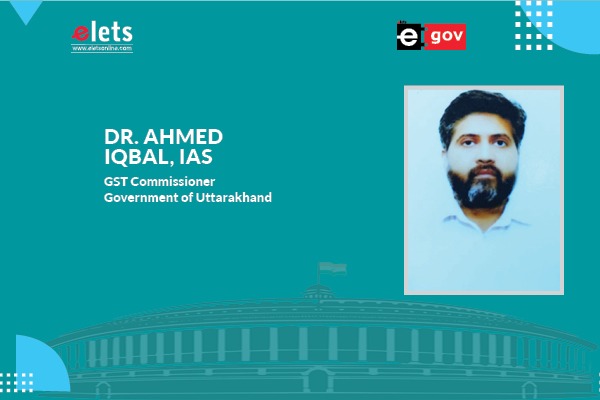
India is shifting its focus from man to machine to improve the speed and quality of economic data. The government is actively involving modern technologies such as Artificial Intelligence, data analytics, and others into existing processes for national benefit. Citing the use of data analytics in monitoring Goods & Services Tax (GST) Tax Evasion, Dr Ahmed Iqbal, IAS, GST Commissioner, Government of Uttarakhand, interacted with Krishna Mishra of Elets News Network.
In your opinion, can data analytics be an effective tool to optimally manage GST revenues?
Yes. The Goods and Service Tax Network (GSTN) portal provides mined and analysed data to the states and the analysed data helps in identifying excessive and doubtful utilisation of Input Tax Credit (ITC), credit availed on fake invoices, and mismatch between returns like GSTR1, GSTR-3B and GSTR-2A, etc. Our IT nodal officer and his team also adopt the techniques to identify areas and taxpayers. By targeting those, we can realise additional revenue. Analysis of E-invoices and E-way bills also helps. I feel data analytics is going to play a much bigger role in the future and tax evaders will find it difficult to evade taxes.

Also Read | Data Analytics Fuels Predictive Policing: Arpit Jain
With the rise in emerging technologies, it is said that automation, AI and Cloud will reshape the future of government operations. How would that transform operations of the GST department?

The data is not being stored on Cloud as of now. Future plans regarding the use of Cloud will have to be developed by the GSTN Portal. A paper has been published by the Organisation for Economic Co-operation and Development (OECD), in which the experience of 21 countries in prevention and detection of tax evasion via technology and several other ideas have been discussed. We intend to take up the issue so that some efforts can be made at an all-India level. GSTN would better answer the details regarding AI and automation as well. But at the state level, we are trying to automate several results, so that the time taken to generate analysed data comes down and follow-up and investigation can happen fast. AI is a new area and we have to see how we can make use of Al techniques.
What are the steps taken by the Government of Uttarakhand to ensure GST compliance? How are you leveraging technology to identify non-compliance and move to a penal action?
We have a system of providing officers with circular updates and legal updates. We have got 24 service profiles developed and have a system of presenting them to the officers every week. We have also started interaction with the trade associations to understand their problems and take suggestions from them. We use print and other types of media to publicise what we are doing. We have identified more than 35 areas where, with follow-up action, we could realise substantial additional revenue. We conduct regular training programmes to improve the knowledge base and capacity of the officers. Most of the presentations happen virtually and we regularly use video conferencing for our meetings.

We are using technology to identify tax evasion areas. Regular data on return defaulters and tax defaulters is being generated and scrutiny is being strengthened. We have realised that audit and investigation will be key areas for us. Recently, we made the first arrest of a tax defaulter and we intend to use the carrot and stick approach.
Also Read | Leveraging Data Analytics to Optimise Revenue Through Transport: Shailabh Sahu
What is the way forward for Uttarakhand’s GST department? Do you see lack of awareness as a cause for non-compliance to GST? If yes, how are you addressing this?
We intend to improve the capacity of our officers and introduce performance reviews on a regular basis. We intend to provide data and information to the officers so that they can achieve results. Taxpayers’ lack of awareness of the consequences of non-registration and non-payment is a problem which will receive greater focus in the coming months. We have already started meeting the trade association and we intend to expand this further. You will see more interactive programmes by the department.
Be a part of Elets Collaborative Initiatives. Join Us for Upcoming Events and explore business opportunities. Like us on Facebook , connect with us on LinkedIn and follow us on Twitter, Instagram.











